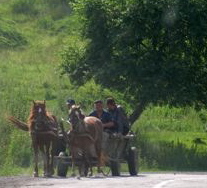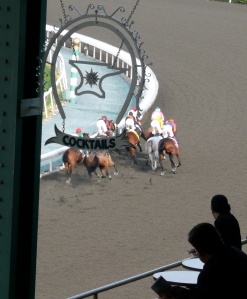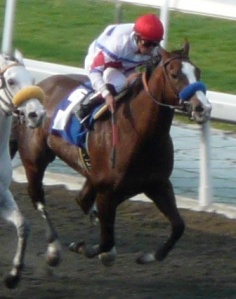I’ve never been much of a horse guy, and in camp I would take my sweet time getting down to the stables where I would inevitably get the Ferdinand of horses, one so plump that to ride him was to do the splits. I was happy to ride that placid black and white creature, happy to wait as he stopped to sample every grass and weed as the counselor called back to us to hurry up and stay with the group.
And then one fine morning, just for the heck of it, I raced down to the barn and the hay and the skinny guy with bad teeth who had been kicked by horses and who assigned you your horse on any given ride. I got there first and I willfully claimed Buck (or was it that that wily trickster with the bow-legs who suggested in?). Either way, Buck was a huge and noble beast—gorgeous muscled chestnut—and as a short plump kid I had never been taller than in that saddle, not even when sitting upon my father’s shoulders after recovering from pneumonia.
We all headed down the trail through dappled morning light, the certainty of Buck’s stride keeping me side-by-side with my counselor. Upon arriving at the wide meadow we customarily passed through we began to cantor. This was the place I would usually be left behind as my steed chose a salad instead, but on this morning things stayed brisk and bracing.
And then, on sudden, Buck broke free as I heard the counselor shouting for us to stop. I didn’t know how, and I didn’t want to. Buck tore across that meadow at thundering gallop and as I glanced back it was like I was Billy The Kid and those Marshals were not going to be taking us in, the counselor and the others fading into a little clump farther and farther behind me and Buck.
Buck cut left into the forest. He was probably trying to lose me as he snaked under fallen leaning trees and through brambles, but I kept my head down and my arms tight around his neck, which was like fur-covered marble, as I clung to him on, what was for me, our renegade break for it. Eventually he got tired and slowed down. My counselor caught up with us—my saddle had twisted half off to the left and I was just barely hanging on.
My counselor helped me down, concerned. We righted the saddle and returned, as a group, and at a calm pace, to the stable where we started. While later I felt some fear as I recalled the mad dash, and have no wish to repeat it, that ride still stands in my mind as a peak moment.
The world we generally live in, the “rational” world, can be said to have been thought up by Rene Descartes, the “I think therefore I am” guy. Descartes thought long and hard about things and his consummate conclusion was that it was ultimately his ability to doubt, to think, which proved his existence.
On the good side of this “breakthrough,” was that the Pope put Descartes’ books in the banned books section of the world (which I can only imagine made them irresistible to Bishops and subsequent Popes), so he was at least instrumental in championing the voice of reason rather than the hocus-pocus power that the Church still wielded in the seventeenth century.
Descartes did not not believe in God, his just chose to trust only what he could find in himself, and in the book that is the world itself. That’s heresy to the Church and yet not far enough for the atheists.
It took until Nietzsche, however, for God to be declared dead. And even then Nietzsche meant that the stagnant God of the Cathedral was dead, the living God, however, could be experienced but only directly and not mediated through authorities.
I thought of Buck when I read how Nietzsche describes a human being as like a rider upon a horse—with the ego-self as the rider who thinks she is in charge, but with the 2,000 pound beast truly the master of where one ultimately goes—an emblem of the deeper Self. This is not rational (I mean “show me the horse,” especially inside a book), but it feels more alive as a way of thinking, living and being.
 Jung was very much impressed with Nietzsche, whose spirit helped Jung veer off the path of hard science and into the depths of the collective unconscious. Jung speaks of the “spirit of the animal” as being very important in one’s individuation—in honoring the paradox of the opposites, rational and non-rational. One of Jung’s best adherents was Marie Louise Von Franz who writes about fairy tales, and in her work she makes it clear how important it is to be nice to animals in fairy tales, as they often hold the key to our success, symbols of the unconscious (as with the fish) or the collective (as with bees and ants, for example) function in the psyche. In fairy tales the horse often stood for the ego, the aspect that one had to give up and become humble in order to achieve any true sort of greatness.
Jung was very much impressed with Nietzsche, whose spirit helped Jung veer off the path of hard science and into the depths of the collective unconscious. Jung speaks of the “spirit of the animal” as being very important in one’s individuation—in honoring the paradox of the opposites, rational and non-rational. One of Jung’s best adherents was Marie Louise Von Franz who writes about fairy tales, and in her work she makes it clear how important it is to be nice to animals in fairy tales, as they often hold the key to our success, symbols of the unconscious (as with the fish) or the collective (as with bees and ants, for example) function in the psyche. In fairy tales the horse often stood for the ego, the aspect that one had to give up and become humble in order to achieve any true sort of greatness.
As we continue to evolve in our consciousness, it makes sense that we strive to bridge the opposites in our own lives and relationships—honoring the realm of the soul and the depths of the spirit and the wild horse, but also finding our way in the world, aligning (if we can) with the spirit of the time, the pragmatic world—the freeways and electronics.
Descartes, quite rationally, implies that if one cannot think and doubt, one does not exist. The only problem is that rationality leaves out soul and spirit—rationality is only half of a life fully lived.
If you think about it, you can build a whole broken world, maybe even the one that we now inhabit, based on the notion that only that which thinks truly exists and is real (what about what feels, what about animals that do not doubt, what about trees, or even chairs, which, to me, seem rather alive in their own quirky ways?) Over idealization of rationalism leads to a science of facts, behaviors and control, and on to “social science,” manufacturing insecurity and then monetizing that doubt—after all, rational realists need deodorant and mouthwash.
The industrial revolution is built upon rationalism (the “iron horse” replacing the real horse), as is capitalism (after all a rational person can count his or her money, so we need not doubt that it exists… or should we?). Because earth doesn’t think, we are free to tear it up and poison it; the animal does not think, so it is virtually a non-being—an object to be used, studied, eaten by those who do exist, and by implication who matter.
On top of such objective rationalism one can build “derivatives” on Wall Street (wasn’t “derivative” once an criticism of the utmost rank for would-be creative work?); on top of such rationalism one can make mass weapons and turn the “other” into the enemy, making war increasingly “effective.”
On the other hand, if we flip “I think therefore I am” on its head we could also posit that it is consciousness that coalesces energy into matter, and in this sense the world is a dense thought, a lucid dream—but still, the compassionate and soulful play in a world as dream would be to recognize that it is all of a piece, a symbol of collective consciousness—one in which there is still no “objective” reality, no way to separate ourselves from any object of inquiry… and no point in using, hurting or exploiting any “thing” (animal, vegetable or mineral… or human)—at least not if we wish to claim our souls and bridge our alienated anguish, the sorrow of life as ashes waiting to happen rather than matter as vessel for spirit.
As we re-examine our lives, again and again in our perpetual unfolding, we also are challenged to re-examine our parenting. When are our kids objects to shape, reinforce and punish versus when are they sacred beings who are reflections of our own irrational souls? Overly rational parenting is dry and leads to empty “success,” while irrational and nonsensical parenting is yeast in the dough.
 I have no great new way, but I do feel like cheering for the irrational, perhaps because it’s my nature to root for the underdog (even maybe the split off and denied undergod?), in the service of inviting the opposites, which is where the divine shows up in lived experience, pulsing in that perplexing symbol that the great consciousness thought up—our very human selves, part body and part spirit—and capable of engaging in the paradox, but at the great risk of losing our soul if we buy-in completely to the rational.
I have no great new way, but I do feel like cheering for the irrational, perhaps because it’s my nature to root for the underdog (even maybe the split off and denied undergod?), in the service of inviting the opposites, which is where the divine shows up in lived experience, pulsing in that perplexing symbol that the great consciousness thought up—our very human selves, part body and part spirit—and capable of engaging in the paradox, but at the great risk of losing our soul if we buy-in completely to the rational.
Maybe today we dedicate to Descartes riding atop Nietzsche’s horse, connected in some shamanic relationship that just might serve a “real” world re-animated with soul as a stable place for all our collective children.
Namaste, Bruce




{ 4 comments… read them below or add one }
Loved this post–it’s all there Bruce, nice writing. Therein lies the problem of the Human Condition–how to determine, or how we see ,our place in the universe, how we choose to react to certain events, how to balance the rational and irrational, all to explain the unknown. When in high school, I read Lucretius. Made all the sense in the world to me at the time: We are just specks of dust in the universe and when the vessel (body) breaks the contents (spirit/anima) spills and is lost. There is no room for the spiritual. While laying the foundation for current Scientific Process, perhaps the thinking was a touch toward the overly rational side of things. Striving for the middle, understanding the opposites–the rational and irrational, looking for the grey areas and moving away from black and whites and the me vs them mentality would seem to open our hearts to see all sides of how our actions may influence each other and nature. Truly, we are all in this together.
Thanks for joining me in the murk and the muddle—the willingness to be confused rather than sacrifice spirit to the rational.
While I’m generally one for following rules, the only time I ever rode a horse, I fell off and never got back on – so I’m all for flouting traditional wisdom where horses are concerned.
I like that—it’s in keeping with the importance of staying true to your instincts… still, if it’s not the horse, you must nevertheless find your animal.